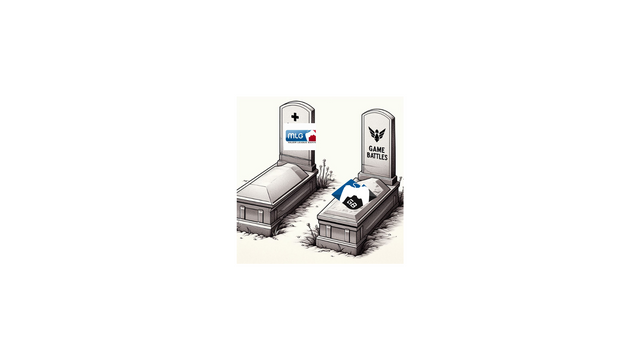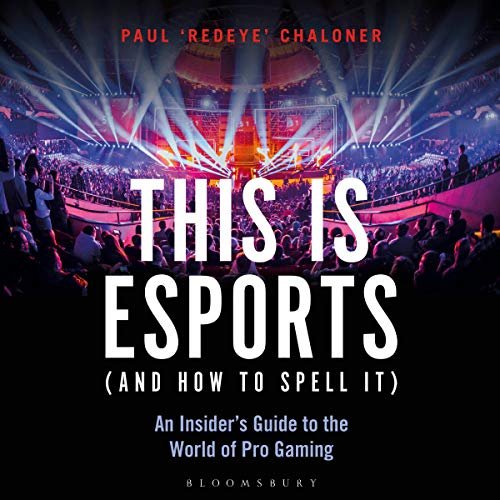
Esports, or competitive video gaming, has become a global phenomenon that attracts millions of fans and investors. But before esports reached its current level of popularity and profitability, there were pioneers who laid the foundations for this industry. Two of them were Major League Gaming (MLG) and GameBattles, which have recently announced their closure after 20 years of service. In this article, we will explore how these platforms contributed to the development of esports, why they are shutting down, and what this means for the future of the industry.

The Book of Esports: The Definitive Guide to Competitive Video Games Audible Logo Audible Audiobook – Unabridged. William Collis (Author, Narrator), Recorded Books (Publisher)
This is esports
The Glory Days of MLG and GameBattles
MLG was founded in 2002 by Sundance DiGiovanni and Mike Sepso, with the vision of creating a professional league for gamers. MLG hosted tournaments for various games, such as Halo, Call of Duty, StarCraft, and League of Legends, and became the largest and most prestigious esports organization in North America. MLG also partnered with GameBattles, a peer-to-peer online platform that allowed gamers to compete in matches and ladder rankings for various games. GameBattles was founded in 2004 by Ryan DeSanto and Matthew Sampson, and became the most popular and active competitive gaming site in the world.
MLG and GameBattles helped shape the esports scene by providing opportunities and exposure for aspiring and professional gamers, as well as creating a loyal and passionate fan base. They also set the standards for production quality, prize money, and sponsorship deals in esports events. Some of the most memorable moments in esports history happened at MLG tournaments, such as the legendary Halo 2 rivalry between Final Boss and Carbon, the epic StarCraft 2 comeback of Leenock, and the dominant performance of OpTic Gaming in Call of Duty. MLG and GameBattles also nurtured some of the biggest names and personalities in esports, such as Ninja, Nadeshot, Scump, and Faker.
The Fall of MLG and GameBattles
Despite their success and influence, MLG and GameBattles faced several challenges and changes that led to their decline and eventual closure. One of them was the rise of new competitors and platforms in the esports industry, such as Twitch, YouTube, ESL, and Valve, which offered more exposure, revenue, and control for gamers and organizers. Another factor was the acquisition of MLG by Activision Blizzard in 2016, which resulted in the loss of autonomy and identity for MLG, as well as the shift of focus to Activision’s own games, such as Overwatch and Call of Duty. Furthermore, the COVID-19 pandemic had a negative impact on the esports industry, as it forced the cancellation or postponement of many events and reduced the income and engagement of many stakeholders.
On December 15, 2023, MLG and GameBattles announced that they would be closing down their platforms on January 15, 2024, marking the end of an era for esports. In their farewell messages, they thanked their fans, players, staff, and partners for their support and dedication over the years, and expressed their pride and gratitude for being part of the esports history. They also encouraged their users to migrate to other platforms, such as Activision’s own Call of Duty League and Overwatch League, or other third-party sites, such as UMG Gaming and CheckMate Gaming.
The Future of Esports
The closure of MLG and GameBattles is a sad and nostalgic moment for many esports fans and players, who grew up watching and playing on these platforms. However, it is also a reminder of how far esports has come, and how much potential it still has. According to Newzoo, a leading market research firm, the esports industry generated $1.45 billion in global revenue in 2023, and is expected to grow to $6.75 billion by 20301. The global esports audience also reached 540 million in 2023, and is projected to increase to 640.8 million by 2025 2. Moreover, the esports industry has diversified and expanded its offerings, with more games, genres, platforms, and formats available for fans and players to enjoy.
However, the future of esports is not guaranteed, and it depends on the continued support and involvement of its stakeholders, especially the fans. As the case of MLG and GameBattles shows, even the most successful and influential platforms can fade away if they fail to adapt to the changing market and consumer preferences. Therefore, it is crucial for esports fans to remain interested and engaged in the industry, and to participate in financially sustainable activities, such as investing, paying to attend events, and putting their own money into it. By doing so, they can help esports continue to grow and thrive, and to avoid the fate of becoming obsolete and forgotten.
How to Invest in Esports
If you are a devoted fan of esports, and you want to make a real impact by not only supporting your favorite team with your voice, but also your wallet, you don’t need a Wall Street background to do this. Here’s a cheat sheet of the legitimate ways to increase your bank account and your team’s success.
Secure a Slice of the Pie
If you want to own a share of an esports organization, you can check out these platforms:
Rally: https://rallyrd.com/ - Invest in esports organizations such as TSM, Dignitas, and Cloud9.
GameStop Marketplace: https://nft.gamestop.com/ - Invest in blockchain-based ownership opportunities (NFTs) from teams like FaZe Clan and Rogue.
Hop on the Esports Train
If you want to invest in the gaming industry as a whole, you can try these options:
Public.com: https://public.com/ - Invest in gaming giants like Activision Blizzard (ATVI), Electronic Arts (EA), and Take-Two Interactive (TTWO) with fractional shares.
Robinhood: https://robinhood.com/ - Trade esports-related ETFs such as the VanEck Vectors Video Game Tech ETF (GAMR).
Show Your Love with Crowdfunding
If you want to sponsor your favorite players and streamers, or back crowdfunding campaigns for things like team training facilities, fan-driven content initiatives, or the next competitive game, you can use these sites:
Patreon: https://www.patreon.com/ - Sponsor your favorite players and streamers with monthly subscriptions.
Kickstarter: https://www.kickstarter.com/ - Back crowdfunding campaigns for things like team training facilities, fan-driven content initiatives, or the next competitive game.
For more information, check out Esports Observer (https://archive.esportsobserver.com/) and The Esports Advocate (https://esportsadvocate.net/) to keep up with the news, investment trends, and success stories. Most importantly, have a blast, join with other fans, and be a part of the future of esports!